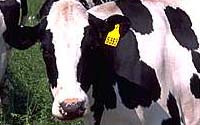UNIVERSITY OF SURREY SECURES GRANT FOR BOVINE TUBERCULOSIS RESEARCH
UNIVERSITY OF SURREY SECURES MAJOR RESEARCH GRANT FOR PIONEERING BOVINE TUBERCULOSIS RESEARCH
A collaborative project between academics in the UK and India aims to develop a revolutionary new control strategy for bovine tuberculosis (TB), with global benefits for human and animal health.
Bovine TB is a major problem in both the developed and developing world. As well as posing a risk to human health, the infection is responsible for huge economic losses in livestock farming, costing the GB taxpayer alone around £100m a year.

In the UK, there is a compulsory bovine TB screening and slaughter programme for cattle, but despite the fact that the BCG vaccination has proven effective in protecting cattle against the disease, it is against the law to vaccinate herds because the BCG interferes with the skin test currently used to detect the infection (giving a positive result whether an animal has been vaccinated against, or is infected with, TB.)
In India, the problem of zoonotic human TB is compounded by the fact that almost 70% of milk sold is processed by the unorganised sector where hygienic practices are not guaranteed. Bovine TB screening and control is also ineffective due to unrestricted animal movements and for socio-economic and cultural reasons.

Johnjoe McFadden, Professor of Molecular Genetics at the University of Surrey, is leading this three-year project which aims to develop a cheaper diagnostic test for bovine TB and a vaccine that could be used alongside it. The project could revolutionise the control of bovine TB, with huge benefits to the economy, as well as livestock and human health – particularly in India.
The team is seeking to delete some of the antigens in the BCG to develop a minus strain and replace the existing skin test (which detects all of the antigens TB produces) with one that detects only a limited number of antigens, those eliminated from the minus strain BCG. This means that the test would only show a positive result if infection with the TB bacillus was detected. The research will focus on identifying which genes to knock out from the BCG – to ensure that any knock-out genes do not impact the effectiveness of the BCG – and designing the diagnostic.
Professor McFadden comments: “While other labs are looking for BCG plus strains, we are doing the opposite and looking at minus strains to make the vaccine more compatible with affordable diagnostics.
“If a suitable new vaccine and diagnostic test can be developed for use in India, it could potentially be transferred to the UK (subject to relevant legislation changes) or even translated for use in humans, avoiding the need for an X-ray to confirm diagnosis following a positive test for TB.”
The research will also benefit from the recent establishment of the University of Surrey School of Veterinary Medicine, which has a strong focus on developing new control strategies for veterinary disease, such as bovine TB.
